AVIS Viswanathan's Blog, page 13
November 14, 2015
“Laugh at Life, at your situation and at yourself!”
‘The Happiness Road’ is a weekly Series on this Blog that appears on Sundays where I share my conversations with people while exploring their idea of happiness!
This Sunday it’s a blessing to be featuring Manohar Devadoss, Chennai’s iconic artist, author and story-teller!!
Being Manohar Devadoss is not easy.
He’s 79 now. And blind.
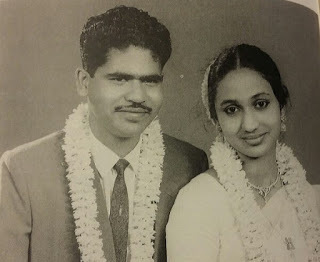 Manohar & Mahema Devadoss at their Wedding
Manohar & Mahema Devadoss at their Wedding
December 30, 1963
Photo Courtesy: Manohar DevadossHe was married to his love Mahema for 45 years. She passed away in 2008. Of these 45 years, Mahema was a quadriplegic – devastated by an accident in December 1972 – for 35 years. And Mano, who began to have progressive, degenerative eyesight around then – leading eventually to total blindness – cared for Mahema for all those 35 years. If Shahjahan built the Taj Mahal for his beloved, Mano ensured – though his love for her, his compassion, his practical thinking, his toiling – that Mahema lived through those 35 years, unable to use her limbs, without a single bedsore! He also anchored himself to stay strong, alongside Mahema, as they raised their beautiful daughter Sujatha in the midst of their individual, physically debilitating, conditions.
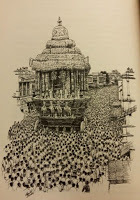 Temple Chariot
Temple Chariot
by Manohar Devadoss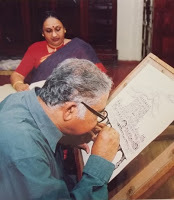 Manohar & Mahema Devadoss
Manohar & Mahema Devadoss
"A Quiet Courage"
Photo Courtesy: Manohar DevadossDespite such a challenged Life, spanning over 50 years, Mano has immersed himself in his art – he has drawn sketches of several temples and chronicled the architecture of his favorite city Madurai; his ink drawings on a heritage series of greeting cards are still a huge draw! And he has written books – two on Madurai and several oh Mahema. Most important, he has always been not just resilient, but has been – and is – happy. You will never find Mano “moping and mourning”. You will only find him smiling beneath his thick moustache, from ear to ear, as he gives you his fullest attention, even while not being able to see you.
Which is why I say, being Manohar Devadoss is not easy.
I ask him how he makes a lifetime’s hard work of accepting and living with adversity so easy – so inspiring.
He replies, “I am not sure my Life is inspiring. I have never tried to be inspiring. I have only tried to live with the way my Life has been. Perhaps, I have this natural flair to laugh at things that normally make you sad. Bringing in humor is a wonderful way to cope with a tough situation. Laughing at yourself and Life helps.”
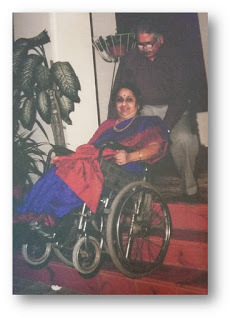 Manohar & Mahema Devadoss
Manohar & Mahema Devadoss
Photo Courtesy: Manohar DevadossSure. One should learn laughing at oneself from Mano! On their 36th wedding anniversary, on December 27th, 1999, Mano gifted Mahema and himself a pair of rusted dumbbells. When Mahema looked on quizzically, Mano said, “You weigh like a sack of potatoes. My back is giving up. In order to lift and move you several times in a day, I need to strengthen my biceps. So, I thought this would be the best gift for us.” He recalls Mahema laughing unstoppably! But Mano went to work on his biceps – working over 700 lifts of the 12.5 kilo dumbbells daily! Result: during the next 9 years that Mahema was alive, Mano never had a back problem!! He says, “Here was a situation. Mahema was unable to move. I was unable to see. But I needed to make sure she was moved around painlessly. I was past 60 – not exactly young – and with a back condition. I had to think practically. I had to find a creative way to stay fit. Besides, working out is a happier way of dealing with a challenge than complaining about a bad back!” “In fact, later on, I would remark to Mahema that she wasn’t weighing like a sack of potatoes anymore, she weighed just as much as a basket of flowers would!” he adds, laughing heartily.
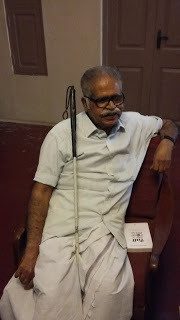 Manohar Devadoss
Manohar Devadoss
Photo by Vaani AnandIt’s hard for me to describe what I feel for the man in front of me. He’s personally tossed up a special salad – with lettuce and walnuts in a fresh home-made mayo dressing – that he calls “Tulsania”. He’s gone to the grocer’s in the morning to shop for the salad. He insists that his helper at home whips up an apple milk shake – “with very little added sugar” – for Vaani and me. Looking at the way he is, the way he cares for you, the way he goes about his Life, you can’t say this man’s been through so much. He’s seen so much pain, so much stress, so much constraint, all through his Life. And yet he has the ability to laugh? So truly, genuinely, happily? I conclude that I don’t feel sorry for him. I feel love. I feel compassion.
 The Tulsiana that Mano tossed up
The Tulsiana that Mano tossed up
Photo by AVIS ViswanathanHis daughter Sujatha lives with her husband and children – he is an American diplomat and so is always serving in another part of the world. Mano lives alone in their Santhome home in Chennai. Vaani is curious to know how Mano copes on a daily basis – now that Mahema is not with him anymore. Mano replies, “It was difficult. But then I feel Mahema’s presence. She is always there with me. I work on the endowments we set up to keep her memory alive, I write books celebrating her Life, I create art which sells and the proceeds go to support causes. You know, when Life has a Purpose, it is easy to deal with Life. Mahema taught me this. I live by this principle to keep myself going, happy and living in the moment.”
Any fears, any insecurities? “Honestly, I try not to think of the future. Yes, but surely I don’t wish I have a paralytic stroke or something, especially at my age, with my eyesight being nil, I don’t want to cause any problems for people around me. I live each day as it comes. Ask me about today and I can tell you how I am feeling, how I am coping. But I can never say anything about tomorrow, nobody can.”
Mano’s Life is not just inspiring. It is awe-inspiring. You will not find Mano philosophical. You will not find him preachy. You will not find him extra-ordinary. You will not find him depressed – never. He’s the perfect embodiment of Zen which teaches us to live Life simply accepting what is – “when hungry eat, when tired sleep”.
That’s why I say, being Manohar Devadoss is not easy. But through the way he has lived his Life he shows us that being happy is easy. Mano’s secret of happiness could possibly be this – accept the situation, think practically, be creative and laugh – at Life, at your situation and at yourself!
Listen more about Mano and Mahema Devadoss’ beautiful Life in this audiobook, “A Quiet Courage”, by Charkha Books here - http://www.flipkart.com/quiet-courage-english/p/itmddg38um4zra4g One of Mano’s books on Madurai is available here: http://www.amazon.com/Multiple-Facets-Madurai-Manohar-Devadoss/dp/8188661627
This Sunday it’s a blessing to be featuring Manohar Devadoss, Chennai’s iconic artist, author and story-teller!!
Being Manohar Devadoss is not easy.
He’s 79 now. And blind.
 Manohar & Mahema Devadoss at their Wedding
Manohar & Mahema Devadoss at their WeddingDecember 30, 1963
Photo Courtesy: Manohar DevadossHe was married to his love Mahema for 45 years. She passed away in 2008. Of these 45 years, Mahema was a quadriplegic – devastated by an accident in December 1972 – for 35 years. And Mano, who began to have progressive, degenerative eyesight around then – leading eventually to total blindness – cared for Mahema for all those 35 years. If Shahjahan built the Taj Mahal for his beloved, Mano ensured – though his love for her, his compassion, his practical thinking, his toiling – that Mahema lived through those 35 years, unable to use her limbs, without a single bedsore! He also anchored himself to stay strong, alongside Mahema, as they raised their beautiful daughter Sujatha in the midst of their individual, physically debilitating, conditions.
 Temple Chariot
Temple Chariot by Manohar Devadoss
 Manohar & Mahema Devadoss
Manohar & Mahema Devadoss "A Quiet Courage"
Photo Courtesy: Manohar DevadossDespite such a challenged Life, spanning over 50 years, Mano has immersed himself in his art – he has drawn sketches of several temples and chronicled the architecture of his favorite city Madurai; his ink drawings on a heritage series of greeting cards are still a huge draw! And he has written books – two on Madurai and several oh Mahema. Most important, he has always been not just resilient, but has been – and is – happy. You will never find Mano “moping and mourning”. You will only find him smiling beneath his thick moustache, from ear to ear, as he gives you his fullest attention, even while not being able to see you.
Which is why I say, being Manohar Devadoss is not easy.
I ask him how he makes a lifetime’s hard work of accepting and living with adversity so easy – so inspiring.
He replies, “I am not sure my Life is inspiring. I have never tried to be inspiring. I have only tried to live with the way my Life has been. Perhaps, I have this natural flair to laugh at things that normally make you sad. Bringing in humor is a wonderful way to cope with a tough situation. Laughing at yourself and Life helps.”
 Manohar & Mahema Devadoss
Manohar & Mahema DevadossPhoto Courtesy: Manohar DevadossSure. One should learn laughing at oneself from Mano! On their 36th wedding anniversary, on December 27th, 1999, Mano gifted Mahema and himself a pair of rusted dumbbells. When Mahema looked on quizzically, Mano said, “You weigh like a sack of potatoes. My back is giving up. In order to lift and move you several times in a day, I need to strengthen my biceps. So, I thought this would be the best gift for us.” He recalls Mahema laughing unstoppably! But Mano went to work on his biceps – working over 700 lifts of the 12.5 kilo dumbbells daily! Result: during the next 9 years that Mahema was alive, Mano never had a back problem!! He says, “Here was a situation. Mahema was unable to move. I was unable to see. But I needed to make sure she was moved around painlessly. I was past 60 – not exactly young – and with a back condition. I had to think practically. I had to find a creative way to stay fit. Besides, working out is a happier way of dealing with a challenge than complaining about a bad back!” “In fact, later on, I would remark to Mahema that she wasn’t weighing like a sack of potatoes anymore, she weighed just as much as a basket of flowers would!” he adds, laughing heartily.
 Manohar Devadoss
Manohar DevadossPhoto by Vaani AnandIt’s hard for me to describe what I feel for the man in front of me. He’s personally tossed up a special salad – with lettuce and walnuts in a fresh home-made mayo dressing – that he calls “Tulsania”. He’s gone to the grocer’s in the morning to shop for the salad. He insists that his helper at home whips up an apple milk shake – “with very little added sugar” – for Vaani and me. Looking at the way he is, the way he cares for you, the way he goes about his Life, you can’t say this man’s been through so much. He’s seen so much pain, so much stress, so much constraint, all through his Life. And yet he has the ability to laugh? So truly, genuinely, happily? I conclude that I don’t feel sorry for him. I feel love. I feel compassion.
 The Tulsiana that Mano tossed up
The Tulsiana that Mano tossed upPhoto by AVIS ViswanathanHis daughter Sujatha lives with her husband and children – he is an American diplomat and so is always serving in another part of the world. Mano lives alone in their Santhome home in Chennai. Vaani is curious to know how Mano copes on a daily basis – now that Mahema is not with him anymore. Mano replies, “It was difficult. But then I feel Mahema’s presence. She is always there with me. I work on the endowments we set up to keep her memory alive, I write books celebrating her Life, I create art which sells and the proceeds go to support causes. You know, when Life has a Purpose, it is easy to deal with Life. Mahema taught me this. I live by this principle to keep myself going, happy and living in the moment.”
Any fears, any insecurities? “Honestly, I try not to think of the future. Yes, but surely I don’t wish I have a paralytic stroke or something, especially at my age, with my eyesight being nil, I don’t want to cause any problems for people around me. I live each day as it comes. Ask me about today and I can tell you how I am feeling, how I am coping. But I can never say anything about tomorrow, nobody can.”
Mano’s Life is not just inspiring. It is awe-inspiring. You will not find Mano philosophical. You will not find him preachy. You will not find him extra-ordinary. You will not find him depressed – never. He’s the perfect embodiment of Zen which teaches us to live Life simply accepting what is – “when hungry eat, when tired sleep”.
That’s why I say, being Manohar Devadoss is not easy. But through the way he has lived his Life he shows us that being happy is easy. Mano’s secret of happiness could possibly be this – accept the situation, think practically, be creative and laugh – at Life, at your situation and at yourself!
Listen more about Mano and Mahema Devadoss’ beautiful Life in this audiobook, “A Quiet Courage”, by Charkha Books here - http://www.flipkart.com/quiet-courage-english/p/itmddg38um4zra4g One of Mano’s books on Madurai is available here: http://www.amazon.com/Multiple-Facets-Madurai-Manohar-Devadoss/dp/8188661627
Published on November 14, 2015 22:48
November 13, 2015
What I learnt chasing Foo Dog figurines
Superstition always leads to fear and worry. Or just the opposite may happen too.
The other day a friend visited us. The conversation hovered on Vaastu and Feng Shui for a while. Then we talked about the merits and demerits of following rituals and believing in superstitions. After my friend left, I reflected, with amazement, on how I had grown out of “investing” in Vaastuand Feng Shui. I have nothing against these practices – I strongly believe they are sciences in their own way – or those who follow them. To be sure, I was, until a few years ago, very superstitious and heavily reliant on Vaastuand Feng Shui to determine how – where and with what – I must live.
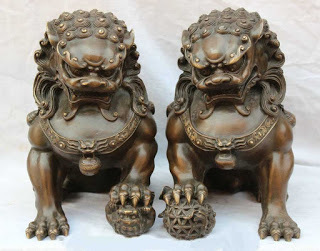 Once, while on a three-day trip to Bangkok, Vaani and I spent over three-quarters of a day, in Chinatown, searching for Foo Dog figurines. Foo Dogs are the ancient sacred dogs of Asia who guard Buddhist temples – our Feng Shui consultant had advised us to get those figurines so that our home could be “protected”. Imagine, hunting for Foo Dog figurines in Bangkok, when there are possibly so many more entertaining, enriching, energizing things to do in that amazing city?!
Once, while on a three-day trip to Bangkok, Vaani and I spent over three-quarters of a day, in Chinatown, searching for Foo Dog figurines. Foo Dogs are the ancient sacred dogs of Asia who guard Buddhist temples – our Feng Shui consultant had advised us to get those figurines so that our home could be “protected”. Imagine, hunting for Foo Dog figurines in Bangkok, when there are possibly so many more entertaining, enriching, energizing things to do in that amazing city?!
Over time, with the practice of daily silence periods, I realized that relying on “external reference points”, however scientific they are or may have then appeared to be to me, are signs of a weak mind, one that is not self-aware. The ones with courage, I discovered, are the ones that know themselves. And if you know yourself, I soon learned to ask myself, why do you need to lean on a crutch __ a talisman, a figurine, a ring or a number? All these crutches are ostensibly to help you navigate better through Life. But Life is not the issue. It is your fear which is weakening you. And the best way to deal with fear is to look it in the eye and face it! These crutches cannot possibly help you face your demons, your fears. Never!
My evolution and learning has also taught me that what scares you often has the power to liberate you. Almost all of us have a good luck charm, a lucky number, and believe in something, often absurd, that we have been conditioned to. Nobody wants to do anything with the number 13 for instance. Or we prefer our favorite colors or numbers. There’s a view some people hold that if you bang into a piece of furniture when you are leaving to get something important accomplished, you must treat that as an early warning sign of something terrible that’s on its way. People that champion a scientific temperament will reason against this, intensely. And which is why those who want to believe in superstitions and premonitions will resist all rational arguments, however reasonable they may be. But here’s a simpler take. If everything is an event in this lifetime, a mere data point, including your birth and your impending death, and since the soul is imperishable, eternal, then what consequence does a furniture that comes in the way or a cat crossing your path or a mere number have?
In anyone’s Life, three things are absolutely inscrutable: birth, death and soul. Now birth is without choice, death is unavoidable and the soul is not visible. What else is important when these three dimensions of your Life are beyond your control? When I look back, I feel that being superstitious, being ritualistic and being wedded to mere methods does make you fearful. And lonely. When I let go of whatever was controlling me, I felt free.
Enjoy being liberated. It’s a beautiful world out there. A stumble here, a fall there, a number here and a cat there, nor Foo Dogs figurines at your door, can make no difference to you, if you choose to feel the air in your lungs, being present in this – the only certain, happening, available, magnificent, miraculous – moment of your Life!
The other day a friend visited us. The conversation hovered on Vaastu and Feng Shui for a while. Then we talked about the merits and demerits of following rituals and believing in superstitions. After my friend left, I reflected, with amazement, on how I had grown out of “investing” in Vaastuand Feng Shui. I have nothing against these practices – I strongly believe they are sciences in their own way – or those who follow them. To be sure, I was, until a few years ago, very superstitious and heavily reliant on Vaastuand Feng Shui to determine how – where and with what – I must live.
 Once, while on a three-day trip to Bangkok, Vaani and I spent over three-quarters of a day, in Chinatown, searching for Foo Dog figurines. Foo Dogs are the ancient sacred dogs of Asia who guard Buddhist temples – our Feng Shui consultant had advised us to get those figurines so that our home could be “protected”. Imagine, hunting for Foo Dog figurines in Bangkok, when there are possibly so many more entertaining, enriching, energizing things to do in that amazing city?!
Once, while on a three-day trip to Bangkok, Vaani and I spent over three-quarters of a day, in Chinatown, searching for Foo Dog figurines. Foo Dogs are the ancient sacred dogs of Asia who guard Buddhist temples – our Feng Shui consultant had advised us to get those figurines so that our home could be “protected”. Imagine, hunting for Foo Dog figurines in Bangkok, when there are possibly so many more entertaining, enriching, energizing things to do in that amazing city?! Over time, with the practice of daily silence periods, I realized that relying on “external reference points”, however scientific they are or may have then appeared to be to me, are signs of a weak mind, one that is not self-aware. The ones with courage, I discovered, are the ones that know themselves. And if you know yourself, I soon learned to ask myself, why do you need to lean on a crutch __ a talisman, a figurine, a ring or a number? All these crutches are ostensibly to help you navigate better through Life. But Life is not the issue. It is your fear which is weakening you. And the best way to deal with fear is to look it in the eye and face it! These crutches cannot possibly help you face your demons, your fears. Never!
My evolution and learning has also taught me that what scares you often has the power to liberate you. Almost all of us have a good luck charm, a lucky number, and believe in something, often absurd, that we have been conditioned to. Nobody wants to do anything with the number 13 for instance. Or we prefer our favorite colors or numbers. There’s a view some people hold that if you bang into a piece of furniture when you are leaving to get something important accomplished, you must treat that as an early warning sign of something terrible that’s on its way. People that champion a scientific temperament will reason against this, intensely. And which is why those who want to believe in superstitions and premonitions will resist all rational arguments, however reasonable they may be. But here’s a simpler take. If everything is an event in this lifetime, a mere data point, including your birth and your impending death, and since the soul is imperishable, eternal, then what consequence does a furniture that comes in the way or a cat crossing your path or a mere number have?
In anyone’s Life, three things are absolutely inscrutable: birth, death and soul. Now birth is without choice, death is unavoidable and the soul is not visible. What else is important when these three dimensions of your Life are beyond your control? When I look back, I feel that being superstitious, being ritualistic and being wedded to mere methods does make you fearful. And lonely. When I let go of whatever was controlling me, I felt free.
Enjoy being liberated. It’s a beautiful world out there. A stumble here, a fall there, a number here and a cat there, nor Foo Dogs figurines at your door, can make no difference to you, if you choose to feel the air in your lungs, being present in this – the only certain, happening, available, magnificent, miraculous – moment of your Life!
Published on November 13, 2015 18:26
November 12, 2015
You are unhappy only when you compromise with your happiness!
Don’t attach meanings to events, people, or technology.
Just be yourself – with whoever, with whatever is. If you can’t be yourself, simply move away from whatever or whoever makes you uncomfortable!
I saw a story doing the rounds that quoted a recent study conducted in Copenhagen which found that people who got off Facebook were a lot happier than those who were addicted to being on it. I humbly disagree.
Nothing external can make you happy or unhappy. Ultimately you alone are responsible for your happiness. Period.
 Technology is a mere enabler. What Facebook has managed to do is that it has brought people closer. It offers us an opportunity to share our lives, experiences and learnings with people we know who are living elsewhere in this world. What can Facebook do if you choose that platform to get into ideological debates with people that you know or start talking to people who don’t know you, who you don’t know, and who make you unhappy? A friend on Facebook is no more or less than someone who is your neighbor or colleague. Either you trust that friend and relate to the person or you don’t. If you do relate, you will enjoy hanging out with that person. If you don’t you won’t. It is simple – as simple as that.
Technology is a mere enabler. What Facebook has managed to do is that it has brought people closer. It offers us an opportunity to share our lives, experiences and learnings with people we know who are living elsewhere in this world. What can Facebook do if you choose that platform to get into ideological debates with people that you know or start talking to people who don’t know you, who you don’t know, and who make you unhappy? A friend on Facebook is no more or less than someone who is your neighbor or colleague. Either you trust that friend and relate to the person or you don’t. If you do relate, you will enjoy hanging out with that person. If you don’t you won’t. It is simple – as simple as that.
We have a simple thumb rule. We don’t add anyone on Facebook who we think we can’t invite into our home. It doesn’t mean everyone who sends us a friend request will either be invited in/accepted at once or will never be accepted. We prefer getting to know newer friends better before adding them. This way we keep our Facebook walls clutter and litter-free.
I must make a confession here – I simply love Facebook. It gives me a continuous opportunity to share and learn from the people I like to hang out. I like to learn and unlearn from the stories and experiences of my friends – who I have let into my Life. So, here lies the nub: only I am responsible for how I am feeling on Facebook.
To be sure, this is not about Facebook alone. In all contexts in Life, your happiness is directly linked to the choices you make. And let me hasten to add, there are really no right or wrong ways to make choices. You just choose. Some experiences work for you and make you happy. Others don’t. As long as you lean in the direction of what makes you happy, you can never go wrong. It is only when you make compromises with your happiness that you become unhappy.
I saw a story doing the rounds that quoted a recent study conducted in Copenhagen which found that people who got off Facebook were a lot happier than those who were addicted to being on it. I humbly disagree.
Nothing external can make you happy or unhappy. Ultimately you alone are responsible for your happiness. Period.
 Technology is a mere enabler. What Facebook has managed to do is that it has brought people closer. It offers us an opportunity to share our lives, experiences and learnings with people we know who are living elsewhere in this world. What can Facebook do if you choose that platform to get into ideological debates with people that you know or start talking to people who don’t know you, who you don’t know, and who make you unhappy? A friend on Facebook is no more or less than someone who is your neighbor or colleague. Either you trust that friend and relate to the person or you don’t. If you do relate, you will enjoy hanging out with that person. If you don’t you won’t. It is simple – as simple as that.
Technology is a mere enabler. What Facebook has managed to do is that it has brought people closer. It offers us an opportunity to share our lives, experiences and learnings with people we know who are living elsewhere in this world. What can Facebook do if you choose that platform to get into ideological debates with people that you know or start talking to people who don’t know you, who you don’t know, and who make you unhappy? A friend on Facebook is no more or less than someone who is your neighbor or colleague. Either you trust that friend and relate to the person or you don’t. If you do relate, you will enjoy hanging out with that person. If you don’t you won’t. It is simple – as simple as that. We have a simple thumb rule. We don’t add anyone on Facebook who we think we can’t invite into our home. It doesn’t mean everyone who sends us a friend request will either be invited in/accepted at once or will never be accepted. We prefer getting to know newer friends better before adding them. This way we keep our Facebook walls clutter and litter-free.
I must make a confession here – I simply love Facebook. It gives me a continuous opportunity to share and learn from the people I like to hang out. I like to learn and unlearn from the stories and experiences of my friends – who I have let into my Life. So, here lies the nub: only I am responsible for how I am feeling on Facebook.
To be sure, this is not about Facebook alone. In all contexts in Life, your happiness is directly linked to the choices you make. And let me hasten to add, there are really no right or wrong ways to make choices. You just choose. Some experiences work for you and make you happy. Others don’t. As long as you lean in the direction of what makes you happy, you can never go wrong. It is only when you make compromises with your happiness that you become unhappy.
Published on November 12, 2015 16:27
November 11, 2015
Get drunk on Life: it gives you an unputdownable high!
Learn to postpone worry! Be in the moment!
Yesterday, I got some quiet time to myself at a café. I find it absolutely necessary to remain silent for some spells – at least one – daily. I use this time to pause, reflect – and importantly to postpone worry!
To be sure, I make a list of all the stuff that worries me – and I have enough and more to worry about, just like you have – and bucket them into two lists. Stuff that I can act on and resolve over time. And stuff that I can’t resolve. Those that I can work on and solve, I convince myself that I need not worry about them. And those that I can’t solve myself, I convince myself again, that I must not worry about them either. This is how, methodically, practically, logically, I postpone worrying on a daily basis.
The biggest benefit of postponing worry is that you are available to the now – and are present in the moment. No past. No future. Which means no grief, anger or guilt over what has happened – the past. And no fear, anxiety or worry over what may happen – the future. No past. No future. You are just present in the moment.
In the present moment there is just beauty. There is complete magic.
Last evening, while at the café, it rained like crazy for about 40 minutes. It was a very heavy downpour. It was also the day after Diwali here in the south of India. Most services were still not available as most people were on an extended festive vacation. I wanted to get back home. But no Uber cars were available. And it was impossible to step out because the rain came down pelting. I stepped out onto the balcony at the café to gauge the intensity of the rain.
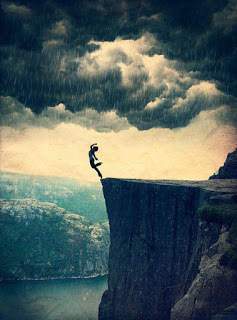
A cat meowed incessantly in a corner of the balcony – perhaps feeling wet and cold in the rain. The café had festive, decorative lights running around the trees on their premises. In the rain, these lights came alive differently – they felt surreal. And the rain created a music which was at the same time intense and sublime.
I was reminded of the opening lines of a Kumar Sanu number from Sir (1993, Mahesh Bhatt, Naseeruddin Shah, Pooja Bhatt, Atul Agnihotri) which goes: “Sun, Sun, Sun Barsaat Ki Dhun Sun…”. It means, “Listen, listen to music of the rain…!”
I spent several minutes staying immersed in the music that the rain made. At another time in my Life, in such weather, I would have preferred to drink my favorite whiskey while watching Amar Akbar Anthony(1977, Manmohan Desai) – perhaps for the millionth time! But, over time, I have learned that you don’t need an induced, artificial intoxicant, to get a high. You can get an inexplicable, unputdownable high if you know how to get drunk on Life by being present in the moment. Perhaps that’s why Jalauddin Rumi, the 13thCentury Persian poet has said this of Life: “Be aware of the pure wine being poured. Don’t complain that you have been handed a dirty cup!”
Yesterday, I got some quiet time to myself at a café. I find it absolutely necessary to remain silent for some spells – at least one – daily. I use this time to pause, reflect – and importantly to postpone worry!
To be sure, I make a list of all the stuff that worries me – and I have enough and more to worry about, just like you have – and bucket them into two lists. Stuff that I can act on and resolve over time. And stuff that I can’t resolve. Those that I can work on and solve, I convince myself that I need not worry about them. And those that I can’t solve myself, I convince myself again, that I must not worry about them either. This is how, methodically, practically, logically, I postpone worrying on a daily basis.
The biggest benefit of postponing worry is that you are available to the now – and are present in the moment. No past. No future. Which means no grief, anger or guilt over what has happened – the past. And no fear, anxiety or worry over what may happen – the future. No past. No future. You are just present in the moment.
In the present moment there is just beauty. There is complete magic.
Last evening, while at the café, it rained like crazy for about 40 minutes. It was a very heavy downpour. It was also the day after Diwali here in the south of India. Most services were still not available as most people were on an extended festive vacation. I wanted to get back home. But no Uber cars were available. And it was impossible to step out because the rain came down pelting. I stepped out onto the balcony at the café to gauge the intensity of the rain.

A cat meowed incessantly in a corner of the balcony – perhaps feeling wet and cold in the rain. The café had festive, decorative lights running around the trees on their premises. In the rain, these lights came alive differently – they felt surreal. And the rain created a music which was at the same time intense and sublime.
I was reminded of the opening lines of a Kumar Sanu number from Sir (1993, Mahesh Bhatt, Naseeruddin Shah, Pooja Bhatt, Atul Agnihotri) which goes: “Sun, Sun, Sun Barsaat Ki Dhun Sun…”. It means, “Listen, listen to music of the rain…!”
I spent several minutes staying immersed in the music that the rain made. At another time in my Life, in such weather, I would have preferred to drink my favorite whiskey while watching Amar Akbar Anthony(1977, Manmohan Desai) – perhaps for the millionth time! But, over time, I have learned that you don’t need an induced, artificial intoxicant, to get a high. You can get an inexplicable, unputdownable high if you know how to get drunk on Life by being present in the moment. Perhaps that’s why Jalauddin Rumi, the 13thCentury Persian poet has said this of Life: “Be aware of the pure wine being poured. Don’t complain that you have been handed a dirty cup!”
Published on November 11, 2015 16:06
November 10, 2015
To be at peace, make peace with your pain
To be sure, no one, simply no one, is spared of pain in this lifetime.
Everyone who is born on the planet has to deal with their share until, as most scriptures say, death “frees” them. This is the truth and this reality is inescapable. It is when we label this share of pain as unfair, unjust and unkind, and therefore resist it, that we suffer.
 Simply, tell your pain off: “Hello, you have come uninvited and I know I can’t do anything about it. So you be where you are, do what you want to do. I am choosing to be unmoved and I am choosing to just be. Now watch your relationship with pain change.” It will potter around with your Life but not at the cost of your missing the opportunity to live!
Simply, tell your pain off: “Hello, you have come uninvited and I know I can’t do anything about it. So you be where you are, do what you want to do. I am choosing to be unmoved and I am choosing to just be. Now watch your relationship with pain change.” It will potter around with your Life but not at the cost of your missing the opportunity to live!
In most Indian homes, despite the best pest control methods available today, it is rare that you will not find lizards. Now, there are many people who grieve at the sight of a lizard. They are petrified of them and imagine horrible consequences of co-existing with them. They cringe and suffer all the time. But there are several million others, across the subcontinent, that just let the lizards be and they be themselves. Yes, everyone wishes that the lizards don’t present themselves in front of them, but when they know they can’t do pretty much anymore, they make their peace and move on. Pain is like the lizard in an Indian home. It just likes to hang round. And it doesn’t have a vicious agenda to terrorize you and make you feel miserable. You suffer only because you hate its presence!
The best way to deal with pain is to make your peace with it. Then, Life becomes worth living.
 Simply, tell your pain off: “Hello, you have come uninvited and I know I can’t do anything about it. So you be where you are, do what you want to do. I am choosing to be unmoved and I am choosing to just be. Now watch your relationship with pain change.” It will potter around with your Life but not at the cost of your missing the opportunity to live!
Simply, tell your pain off: “Hello, you have come uninvited and I know I can’t do anything about it. So you be where you are, do what you want to do. I am choosing to be unmoved and I am choosing to just be. Now watch your relationship with pain change.” It will potter around with your Life but not at the cost of your missing the opportunity to live! In most Indian homes, despite the best pest control methods available today, it is rare that you will not find lizards. Now, there are many people who grieve at the sight of a lizard. They are petrified of them and imagine horrible consequences of co-existing with them. They cringe and suffer all the time. But there are several million others, across the subcontinent, that just let the lizards be and they be themselves. Yes, everyone wishes that the lizards don’t present themselves in front of them, but when they know they can’t do pretty much anymore, they make their peace and move on. Pain is like the lizard in an Indian home. It just likes to hang round. And it doesn’t have a vicious agenda to terrorize you and make you feel miserable. You suffer only because you hate its presence!
The best way to deal with pain is to make your peace with it. Then, Life becomes worth living.
Published on November 10, 2015 21:37
What I learnt from Tenzin Gyatso: “Stay Humble, Stay Happy, Stay Human”
Every once in a while, someone will come into your Life and make you sit up and appreciate the value of being human – and being happy.
On my Life’s journey I have met a few people who have had a profound impact on my outlook to Life and have inspired me to be happy. But this morning at the Extra Mural Lecture Series at IIT-Madras, The XIVth Dalai Lama, Tenzin Gyatso, invited me to look at Life and happiness afresh.
He raised the pitch and perspective to a higher-than-30,000-ft-level saying each of us has a responsibility to make this Century, the 21st Century, the Century of Happiness. And even as he delivered this profound message, he ensured that he gently, beautifully, stirred your soul and made you realize that the real purpose of your creation – and mine – is to be happy!
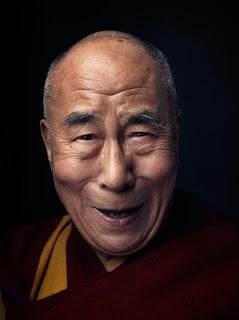 Tenzin Gyatso: The XIVth Dalai Lama
Tenzin Gyatso: The XIVth Dalai Lama
Picture Courtesy: TIME/InternetThe Dalai Lama began by simply being who he is – he is simplicity personified. He picked up an apple, from a fruit basket that had been given to him by IIT-M Director Prof. Bhaskar Ramamurthi as a welcome gesture, and kept chomping on it all through his lecture. He said, “I prefer informality. I prefer all of us treating each other as humans. That way there is equality. You know, the moment I start looking at myself as a Tibetan or as a Buddhist monk, then I begin to treat myself with exclusivity. And let me tell you if I start referring to myself as The Dalai Lama – I am the only Dalai Lama in the world which has over 7 billion people – then it gets very lonely. So, I am just another human being like you. I like it this way. This is when we can have a conversation – you and me!”
He made a very strong case for humanity and happiness. He said that all humans, intrinsically, basically, are compassionate. And all human beings want a happy Life – and they have a right to be happy! All destructive emotions – anger, hatred, fear – are secondary. They arise in people only when their idea of happiness is disturbed. Each individual, he pointed out, has a responsibility: to go back to the basic human state of compassion, to have a vision to make this world happier and to develop the patience to attain this vision. “But it is a personal choice,” he reiterated, adding, “That is why the Buddha said, ‘You are your own Master.’ Your happiness is in your hands and in your actions – mental, verbal and physical actions. So, you can go to work on what I have shared with you or you can drop it.”
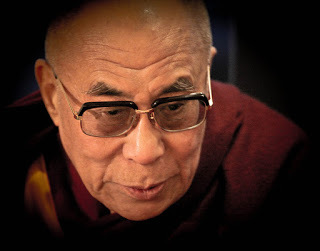 Tenzin Gyatso: The XIVth Dalai Lama
Tenzin Gyatso: The XIVth Dalai Lama
Picture Courtesy: TIME/InternetHe made us pause and think of religion and its role and purpose. He patiently elucidated what the various religions are trying to say. He led us to understand that each religion, and the multiple philosophies professed by each religion, may appear to be different. But ultimately all of them are promoting human well-being and happiness. Again, he championed that it was an individual responsibility for each of us to stay focused on the bigger picture of what each religion was striving to achieve. “The true meaning of secular is to respect all religions and their followers and respect all those who are non-believers (in religion) too. It is our responsibility to work towards religious harmony among the world’s people. That’s my commitment,” he said.
At 80, The Dalai Lama lives and leads his Life’s message from the front. Not in his spiritual role. Not in its political avatar. To me, he has relinquished both. The political mandate he gave up in September 2011 when he retired from the Central Tibetan Administration. And he is hardly interested in continuing in the spiritual role either, of being a reincarnation of Avalokitesvara – the Boddhisattva of Compassion. In an interview he gave a German newspaper in September 2014, The Dalai Lama has indicated that he is not keen on the tradition of the Dalai Lama, which has stayed for over 5 centuries, continuing any longer. In fact, he spoke about it briefly this morning too. “Even the Dalai Lama institution has become feudal over the years. It’s time for change. Which is why, I prefer dealing with people at a human level not as a reincarnation of Avalokitesvara,” he said.
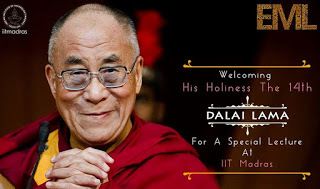 My family and I – who are together for the first time in 8 years for Diwali – could not have found a more enriching experience on a Diwali morning! Just being in the presence of the man is such a blessing. Here’s someone who has stripped himself of all the trappings of power and exclusivity and has gone to the root of human existence to promote compassion and happiness among the world’s people. I don’t know of too many statesmen and global leaders who have been able to do that or are doing that. Which is why, perhaps, over 3000 of us in the audience at the Student Activities Centre at IIT-M clung on to his every word, having chosen to pause our Diwali celebrations.
My family and I – who are together for the first time in 8 years for Diwali – could not have found a more enriching experience on a Diwali morning! Just being in the presence of the man is such a blessing. Here’s someone who has stripped himself of all the trappings of power and exclusivity and has gone to the root of human existence to promote compassion and happiness among the world’s people. I don’t know of too many statesmen and global leaders who have been able to do that or are doing that. Which is why, perhaps, over 3000 of us in the audience at the Student Activities Centre at IIT-M clung on to his every word, having chosen to pause our Diwali celebrations.
They call him ‘His Holiness’. But I won’t call him so. As he chomped on his apple, and kept repeating how delicious it was, he taught us the value of being humble, being happy and being human. To me, therefore, Tenzin Gyatso is just a happy, humble, human being! And so he inspires me to be one myself!
On my Life’s journey I have met a few people who have had a profound impact on my outlook to Life and have inspired me to be happy. But this morning at the Extra Mural Lecture Series at IIT-Madras, The XIVth Dalai Lama, Tenzin Gyatso, invited me to look at Life and happiness afresh.
He raised the pitch and perspective to a higher-than-30,000-ft-level saying each of us has a responsibility to make this Century, the 21st Century, the Century of Happiness. And even as he delivered this profound message, he ensured that he gently, beautifully, stirred your soul and made you realize that the real purpose of your creation – and mine – is to be happy!
 Tenzin Gyatso: The XIVth Dalai Lama
Tenzin Gyatso: The XIVth Dalai LamaPicture Courtesy: TIME/InternetThe Dalai Lama began by simply being who he is – he is simplicity personified. He picked up an apple, from a fruit basket that had been given to him by IIT-M Director Prof. Bhaskar Ramamurthi as a welcome gesture, and kept chomping on it all through his lecture. He said, “I prefer informality. I prefer all of us treating each other as humans. That way there is equality. You know, the moment I start looking at myself as a Tibetan or as a Buddhist monk, then I begin to treat myself with exclusivity. And let me tell you if I start referring to myself as The Dalai Lama – I am the only Dalai Lama in the world which has over 7 billion people – then it gets very lonely. So, I am just another human being like you. I like it this way. This is when we can have a conversation – you and me!”
He made a very strong case for humanity and happiness. He said that all humans, intrinsically, basically, are compassionate. And all human beings want a happy Life – and they have a right to be happy! All destructive emotions – anger, hatred, fear – are secondary. They arise in people only when their idea of happiness is disturbed. Each individual, he pointed out, has a responsibility: to go back to the basic human state of compassion, to have a vision to make this world happier and to develop the patience to attain this vision. “But it is a personal choice,” he reiterated, adding, “That is why the Buddha said, ‘You are your own Master.’ Your happiness is in your hands and in your actions – mental, verbal and physical actions. So, you can go to work on what I have shared with you or you can drop it.”
 Tenzin Gyatso: The XIVth Dalai Lama
Tenzin Gyatso: The XIVth Dalai LamaPicture Courtesy: TIME/InternetHe made us pause and think of religion and its role and purpose. He patiently elucidated what the various religions are trying to say. He led us to understand that each religion, and the multiple philosophies professed by each religion, may appear to be different. But ultimately all of them are promoting human well-being and happiness. Again, he championed that it was an individual responsibility for each of us to stay focused on the bigger picture of what each religion was striving to achieve. “The true meaning of secular is to respect all religions and their followers and respect all those who are non-believers (in religion) too. It is our responsibility to work towards religious harmony among the world’s people. That’s my commitment,” he said.
At 80, The Dalai Lama lives and leads his Life’s message from the front. Not in his spiritual role. Not in its political avatar. To me, he has relinquished both. The political mandate he gave up in September 2011 when he retired from the Central Tibetan Administration. And he is hardly interested in continuing in the spiritual role either, of being a reincarnation of Avalokitesvara – the Boddhisattva of Compassion. In an interview he gave a German newspaper in September 2014, The Dalai Lama has indicated that he is not keen on the tradition of the Dalai Lama, which has stayed for over 5 centuries, continuing any longer. In fact, he spoke about it briefly this morning too. “Even the Dalai Lama institution has become feudal over the years. It’s time for change. Which is why, I prefer dealing with people at a human level not as a reincarnation of Avalokitesvara,” he said.
 My family and I – who are together for the first time in 8 years for Diwali – could not have found a more enriching experience on a Diwali morning! Just being in the presence of the man is such a blessing. Here’s someone who has stripped himself of all the trappings of power and exclusivity and has gone to the root of human existence to promote compassion and happiness among the world’s people. I don’t know of too many statesmen and global leaders who have been able to do that or are doing that. Which is why, perhaps, over 3000 of us in the audience at the Student Activities Centre at IIT-M clung on to his every word, having chosen to pause our Diwali celebrations.
My family and I – who are together for the first time in 8 years for Diwali – could not have found a more enriching experience on a Diwali morning! Just being in the presence of the man is such a blessing. Here’s someone who has stripped himself of all the trappings of power and exclusivity and has gone to the root of human existence to promote compassion and happiness among the world’s people. I don’t know of too many statesmen and global leaders who have been able to do that or are doing that. Which is why, perhaps, over 3000 of us in the audience at the Student Activities Centre at IIT-M clung on to his every word, having chosen to pause our Diwali celebrations. They call him ‘His Holiness’. But I won’t call him so. As he chomped on his apple, and kept repeating how delicious it was, he taught us the value of being humble, being happy and being human. To me, therefore, Tenzin Gyatso is just a happy, humble, human being! And so he inspires me to be one myself!
Published on November 10, 2015 02:35
November 8, 2015
Of growing up and the art of living
There is no right time to start “living”. If you have begun to enjoy the process of Life – no matter what the circumstances – you have learnt the art of living and you are now living a full Life!
It was my birthday sometime last week. Among all those who called to wish me, was a friend from college, one of the few people on the planet who has known me for longer than Vaani has. He wondered if I was 50 yet. And I said I have two more years to get there!
What followed was a pretty interesting conversation that I am happy to share here.
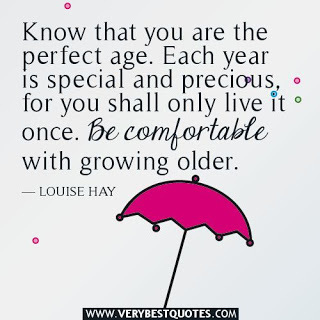 Him: What do you think of age – especially when you think of it on your birthday? Does it make you feel older, wiser?
Him: What do you think of age – especially when you think of it on your birthday? Does it make you feel older, wiser?
Me: Your birthday is an event which is truly something that you haven’t contributed to. And the process of biological aging too is both beyond your control and irreversible. So, I don’t think of these things. I only focus on how I am feeling. Most of the time, I am filled with excitement, curiosity and a sense of adventure over the uncertainty that surrounds my Life and career. There are times when I do feel some physical discomfort – a headache here, my rheumatoid arthritic condition there and such – but everyone has to deal with this at some time in their lives.
Him: Do you get reflective on your birthday?
Me: Birthdays are, yes, a good time to pause and reflect. I have often done that. And it helps evaluating yourself on the ‘living’ quotient. I feel that I was merely existing until I was 35 – earning a living, chasing name, fame, money! But through the most difficult period of my Life, in the past decade or more, I feel I have lived, and not merely existed! Given the bankruptcy that we are grappling with, as a Firm and as a family, Life is very, very tough. But there’s inner peace, there’s joy in living each moment and there is happiness and contentment with whatever is.
Him: I know you to be a driven person. You have always set yourself very ambitious goals and you have also gone and got them. Has your ambitious nature dissolved with age?
Me: Ambition, as I have come to understand, can manifest as avarice and as hunger. I used to be materialistically avaricious. Now I am spiritually hungry. So, I am still ambitious, but in a different sort of way!
Me: Hey, listen, what is this that you are leading me on to...shooting so many questions at me?
Him: Just curious…that’s why…to see what is the difference between growing older and growing up…?
Me: Oh come on, I am not sure I have grown up yet. All I am sure about is that I have learnt to live fully, happily, despite the circumstances that pin me down!
The essence of intelligent living is to understand the true nature of Life – of its beauty, its magic and its impermanence – and start living in the now. This alone can lead you to inner peace and happiness. Birthdays will come and go, seasons will come and go, success and failure will come and go, people will come and go, birth and death will keep on happening, and everything around you will change, but ultimately you, only you have to learn to live through and amidst all this change. This is the art of living.
It was my birthday sometime last week. Among all those who called to wish me, was a friend from college, one of the few people on the planet who has known me for longer than Vaani has. He wondered if I was 50 yet. And I said I have two more years to get there!
What followed was a pretty interesting conversation that I am happy to share here.
 Him: What do you think of age – especially when you think of it on your birthday? Does it make you feel older, wiser?
Him: What do you think of age – especially when you think of it on your birthday? Does it make you feel older, wiser?Me: Your birthday is an event which is truly something that you haven’t contributed to. And the process of biological aging too is both beyond your control and irreversible. So, I don’t think of these things. I only focus on how I am feeling. Most of the time, I am filled with excitement, curiosity and a sense of adventure over the uncertainty that surrounds my Life and career. There are times when I do feel some physical discomfort – a headache here, my rheumatoid arthritic condition there and such – but everyone has to deal with this at some time in their lives.
Him: Do you get reflective on your birthday?
Me: Birthdays are, yes, a good time to pause and reflect. I have often done that. And it helps evaluating yourself on the ‘living’ quotient. I feel that I was merely existing until I was 35 – earning a living, chasing name, fame, money! But through the most difficult period of my Life, in the past decade or more, I feel I have lived, and not merely existed! Given the bankruptcy that we are grappling with, as a Firm and as a family, Life is very, very tough. But there’s inner peace, there’s joy in living each moment and there is happiness and contentment with whatever is.
Him: I know you to be a driven person. You have always set yourself very ambitious goals and you have also gone and got them. Has your ambitious nature dissolved with age?
Me: Ambition, as I have come to understand, can manifest as avarice and as hunger. I used to be materialistically avaricious. Now I am spiritually hungry. So, I am still ambitious, but in a different sort of way!
Me: Hey, listen, what is this that you are leading me on to...shooting so many questions at me?
Him: Just curious…that’s why…to see what is the difference between growing older and growing up…?
Me: Oh come on, I am not sure I have grown up yet. All I am sure about is that I have learnt to live fully, happily, despite the circumstances that pin me down!
The essence of intelligent living is to understand the true nature of Life – of its beauty, its magic and its impermanence – and start living in the now. This alone can lead you to inner peace and happiness. Birthdays will come and go, seasons will come and go, success and failure will come and go, people will come and go, birth and death will keep on happening, and everything around you will change, but ultimately you, only you have to learn to live through and amidst all this change. This is the art of living.
Published on November 08, 2015 20:40
“That my singing has made so many people happy makes me happy.”
‘The Happiness Road’ is a weekly Series on this Blog that appears on Sundays where I share my conversations with people while exploring their idea of happiness!
This Sunday features a beautiful conversation that Vaani and I had with one of India’s most talented and loved singers – S.P.Balasubrahmanyam (simply SPB or Balu Sir to many)!!
What do you do when you meet – finally meet – the man, listening to whose voice you have grown up? A voice that has stirred the most aesthetic, spiritual and romantic emotions in you – every single time that you have heard it?
Well if you are Vaani, you just let go, you melt and dissolve in the magic and beauty of the moment, and you tear up. “I can’t believe this is true….that I am in your presence,” gushed Vaani while shaking SPB’s hands, even as he welcomed us warming into his tastefully done up living room.
I was more reflective. I found a sliver of time between the hellos, welcomes and thank-yous that we exchanged, to let “Manram Vantha Thendrallukku, Manjam Vara Nenjam Ilayo” from Mouna Ragam (1986, Mani Ratnam, Ilayaraja, Vaali) seep through my inner consciousness. It is my absolute, all-time favorite SPB number. And I sent a prayer in gratitude to the Universe, to Life, for creating and nurturing this man, so that his exceptional voice could light up our lives!
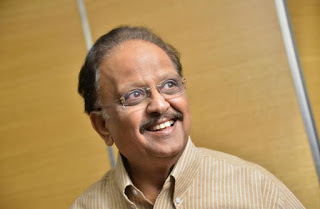 SPB: Picture Courtesy - The Hindu/Internet69-year-old SPB will start his 50th year in playback singing on 15thDecember this year – he made his debut in 1966 with a Telugu song in the film Sri Sri Sri Maryada Ramanna. So I ask him the most logical question: Does he feel happy, accomplished…?
SPB: Picture Courtesy - The Hindu/Internet69-year-old SPB will start his 50th year in playback singing on 15thDecember this year – he made his debut in 1966 with a Telugu song in the film Sri Sri Sri Maryada Ramanna. So I ask him the most logical question: Does he feel happy, accomplished…?
He beams his famous, big, adorable smile. He then leans forward and says, “Yes!!! 49 years is a long time. But let me tell you truthfully, I did not come into this industry with any goal. I had no idea. Nor any ideals. I had then thought that I will not last beyond a couple of songs. But I have survived here, somehow pulled along…you can say! So, I often reflect on these past years with a sense of immense gratitude; I am grateful to the Almighty for giving my lifetime a sense of purpose. That my singing has made so many people happy makes me happy. I feel I am blessed.”
SPB adds that he is also grateful for his father’s native wisdom. When he had approached his father, soon after testing the waters in playback singing, not sure if this would be the right career to earn a living, asking if he should go back to leaning on his training in engineering, his father only told him “not to ride two horses at the same time”. “His advice was suggestive, not directive. I chose singing because it made me happy while engineering did not give me that sense of joy. I taught myself to sing better and continue to learn to sing better with every new song and every new music composer I work with. I sing both for my inner joy and to earn a living. It is so humbling when people come to me and tell me that they feel I have sung a song especially for them. Hearing this makes me fulfilled and happy,” explains SPB.
Vaani suggests that he is being very modest, referring to his confession that he is an “untrained singer who is still learning”. “Amma,” he clarifies, “I have only one qualification. I know what I don’t know. I am very happy when I am able to deliver what my captain, the music director, wants out of me. The day I can’t do that, I will quit singing.”
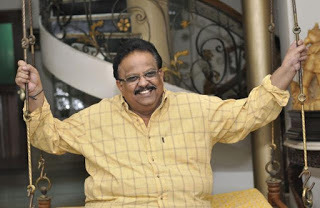 SPB: Picture Courtesy - The Hindu/InternetThat’s an exacting standard to live by for anyone. But here’s a man who’s lived by it for half a century – for almost as long as Vaani and I have been on this planet – and is still singing at his peak. How does he do it? What’s the secret of his longevity in the business and of his continued relevance across at least three generations? “I start each day with a simple question – how can I enjoy myself today? I don’t worry and I don’t entertain any insecurities. I work hard when I am I asked to sing. And when I not singing, I am living my Life fully – hanging out, having fun!” he reveals.
SPB: Picture Courtesy - The Hindu/InternetThat’s an exacting standard to live by for anyone. But here’s a man who’s lived by it for half a century – for almost as long as Vaani and I have been on this planet – and is still singing at his peak. How does he do it? What’s the secret of his longevity in the business and of his continued relevance across at least three generations? “I start each day with a simple question – how can I enjoy myself today? I don’t worry and I don’t entertain any insecurities. I work hard when I am I asked to sing. And when I not singing, I am living my Life fully – hanging out, having fun!” he reveals.
SPB wears his Life on his sleeve. He is disarmingly honest and humble: “I am not a perfect human being. I am just another human being. I had a smoking habit which I gave up some time ago. I am a social drinker. I have never been prudent with my finances – until recently I even had commitments to fulfil. Just because I am a singer, just because I have a public profile, I can’t be a hypocrite. Nor can I be a sanyasi. I don’t want to. I am happy being who I am. And I have no problem with people knowing who I am.”
I am keen to know how SPB remains anchored, grounded – anyone with a Padma Bhushan, 6 National Awards and several Filmfare Awards, with 40,000 songs and with such devotion from an ever-growing fan following can get carried away, right? “I was inspired to take up singing by listening to Mohd. Rafi; I have worked for composers like K.V.Mahadevan, M.S.Viswanathan, Laxmikant Pyarelal, Naushad, O.P.Nayyar, Panchamda, Ilayaraja and A.R.Rahman; I have sung alongside greats like S.Janaki, P.Susheela, Lata Mangeshkar and so many, many more accomplished artistes…how can anyone have an ego if your career has evolved among such legends? In front of them I am a nobody. If I am a somebody it is because of them, their love, their support and encouragement,” he says, playing down my question.
SPB counts the following among some of his Life’s greatest moments:
· Touching Mohd.Rafi’s feet, in a break between takes, during a recording at Prasad studios: “I was recording in the neighboring studio and rushed to try and see him. There was a break in his schedule. I went up to him and touched his feet. He look at me and asked ‘Aap Kaun Hain?’…I was too timid to introduce myself although I was an established singer by then. I said, ‘It doesn’t matter’. Truly, to me, in his presence, who I was really didn’t matter. I smiled gratefully and quickly left the studio.”· Having O.P.Nayyar over for breakfast at his Kodambakkam home in Chennai: “O.P Sir told me that he never goes to anyone’s house. But he promised to come home provided we served him vadai and sambar. After breakfast, he stayed on…soon he was composing music with me and we spent a couple of hours just singing and making music…isn’t that experience priceless?”· Featuring in Naushad’s biography, “Naushadnama: The Life and Music of Naushad” (Raju Bharatan, Hay House, 2013): “Naushad loved me for delivering an 8+-minute song in a single take for Teri Payal Mere Geet (1993, Rehman Naushad, Govinda, Meenakshi Seshadri). In his biography, I feature in one para where he talks about me being ‘the most hard-working and professional singer’ he has ever worked with. He lauds me for being ‘self-trained’. To me, that compliment is equal to getting the Bharat Ratna.”· Knowing R.D.Burman as a friend and as a composer: “I was coming back to Sea Rock Hotel late one evening, after a full day’s recording in Mumbai. As I was entering the hotel, I heard Pancham’s voice call out ‘Balu’. I turned to find him sitting on a ledge outside in the dark. Pancham was out of work in those days and playfully chided me for not calling him when I came into Mumbai. He then pulled out a bottle of Black Label whiskey…we went up to my room and we made music even as we drank. I am blessed to have had his friendship and love in my Life.”
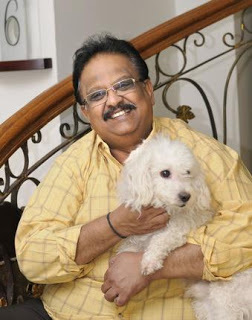 SPB: Picture Courtesy - The Hindu/InternetHe’s played many professional roles in his Life: singer, composer, actor, producer, voice-over artist, TV show host…which of these does he love doing the most? “Undoubtedly it is singing that I love. Music is my sacred, divine, Life source. It has given me everything. It has given me work and it has given me the strength to work. It is what makes me happy every single day,” he avers. So, how did he then allow surgeries – twice – for polyps on his vocal cords; didn’t he feel insecure, didn’t he fear losing his precious voice? “Everyone from my family to friends to even Lataji (Mangeshkar) advised me against having ‘metal interface with my vocal cords’. But I decided to go ahead. You have to do what you have to in Life. Honestly, I never felt fearful of the procedure. I just reconciled to the fact that at the end of the surgeries I would either have my voice or I wouldn’t have it. Fortunately, I had my voice intact and within a few days of the last surgery I was back to doing my riyaaz.”
SPB: Picture Courtesy - The Hindu/InternetHe’s played many professional roles in his Life: singer, composer, actor, producer, voice-over artist, TV show host…which of these does he love doing the most? “Undoubtedly it is singing that I love. Music is my sacred, divine, Life source. It has given me everything. It has given me work and it has given me the strength to work. It is what makes me happy every single day,” he avers. So, how did he then allow surgeries – twice – for polyps on his vocal cords; didn’t he feel insecure, didn’t he fear losing his precious voice? “Everyone from my family to friends to even Lataji (Mangeshkar) advised me against having ‘metal interface with my vocal cords’. But I decided to go ahead. You have to do what you have to in Life. Honestly, I never felt fearful of the procedure. I just reconciled to the fact that at the end of the surgeries I would either have my voice or I wouldn’t have it. Fortunately, I had my voice intact and within a few days of the last surgery I was back to doing my riyaaz.”
My takeaway from the conversation we had with SPB is this – do what you love doing, do it very well, live in the moment, enjoy each day, fear nothing, worry about nothing and you will be happy all your Life. I guess that’s too simple a way – in a single line – to summarize the Life and work of a man whose voice has stirred and enriched our souls for 49 years! But that’s really who SPB is. Simple, professional, humble, gifted, and above all, blessed.
The first rains of the North-East monsoon drench Chennai as we leave his home. On our ride back in an Uber, an FM station plays a rare SPB number, the title song “Ninaithale Innikkum”, from K.Balachander’s 1979 movie of the same name (M.S.Viswanathan, Kannadasan). I think of the 90-minutes we had just spent with SPB and I exclaim to Vaani, “How serendipitous!” This is one memory which, when we think back at any time in the future, will be among our most precious ones – “Ninaithale Innikkum”!
This Sunday features a beautiful conversation that Vaani and I had with one of India’s most talented and loved singers – S.P.Balasubrahmanyam (simply SPB or Balu Sir to many)!!
What do you do when you meet – finally meet – the man, listening to whose voice you have grown up? A voice that has stirred the most aesthetic, spiritual and romantic emotions in you – every single time that you have heard it?
Well if you are Vaani, you just let go, you melt and dissolve in the magic and beauty of the moment, and you tear up. “I can’t believe this is true….that I am in your presence,” gushed Vaani while shaking SPB’s hands, even as he welcomed us warming into his tastefully done up living room.
I was more reflective. I found a sliver of time between the hellos, welcomes and thank-yous that we exchanged, to let “Manram Vantha Thendrallukku, Manjam Vara Nenjam Ilayo” from Mouna Ragam (1986, Mani Ratnam, Ilayaraja, Vaali) seep through my inner consciousness. It is my absolute, all-time favorite SPB number. And I sent a prayer in gratitude to the Universe, to Life, for creating and nurturing this man, so that his exceptional voice could light up our lives!
 SPB: Picture Courtesy - The Hindu/Internet69-year-old SPB will start his 50th year in playback singing on 15thDecember this year – he made his debut in 1966 with a Telugu song in the film Sri Sri Sri Maryada Ramanna. So I ask him the most logical question: Does he feel happy, accomplished…?
SPB: Picture Courtesy - The Hindu/Internet69-year-old SPB will start his 50th year in playback singing on 15thDecember this year – he made his debut in 1966 with a Telugu song in the film Sri Sri Sri Maryada Ramanna. So I ask him the most logical question: Does he feel happy, accomplished…? He beams his famous, big, adorable smile. He then leans forward and says, “Yes!!! 49 years is a long time. But let me tell you truthfully, I did not come into this industry with any goal. I had no idea. Nor any ideals. I had then thought that I will not last beyond a couple of songs. But I have survived here, somehow pulled along…you can say! So, I often reflect on these past years with a sense of immense gratitude; I am grateful to the Almighty for giving my lifetime a sense of purpose. That my singing has made so many people happy makes me happy. I feel I am blessed.”
SPB adds that he is also grateful for his father’s native wisdom. When he had approached his father, soon after testing the waters in playback singing, not sure if this would be the right career to earn a living, asking if he should go back to leaning on his training in engineering, his father only told him “not to ride two horses at the same time”. “His advice was suggestive, not directive. I chose singing because it made me happy while engineering did not give me that sense of joy. I taught myself to sing better and continue to learn to sing better with every new song and every new music composer I work with. I sing both for my inner joy and to earn a living. It is so humbling when people come to me and tell me that they feel I have sung a song especially for them. Hearing this makes me fulfilled and happy,” explains SPB.
Vaani suggests that he is being very modest, referring to his confession that he is an “untrained singer who is still learning”. “Amma,” he clarifies, “I have only one qualification. I know what I don’t know. I am very happy when I am able to deliver what my captain, the music director, wants out of me. The day I can’t do that, I will quit singing.”
 SPB: Picture Courtesy - The Hindu/InternetThat’s an exacting standard to live by for anyone. But here’s a man who’s lived by it for half a century – for almost as long as Vaani and I have been on this planet – and is still singing at his peak. How does he do it? What’s the secret of his longevity in the business and of his continued relevance across at least three generations? “I start each day with a simple question – how can I enjoy myself today? I don’t worry and I don’t entertain any insecurities. I work hard when I am I asked to sing. And when I not singing, I am living my Life fully – hanging out, having fun!” he reveals.
SPB: Picture Courtesy - The Hindu/InternetThat’s an exacting standard to live by for anyone. But here’s a man who’s lived by it for half a century – for almost as long as Vaani and I have been on this planet – and is still singing at his peak. How does he do it? What’s the secret of his longevity in the business and of his continued relevance across at least three generations? “I start each day with a simple question – how can I enjoy myself today? I don’t worry and I don’t entertain any insecurities. I work hard when I am I asked to sing. And when I not singing, I am living my Life fully – hanging out, having fun!” he reveals. SPB wears his Life on his sleeve. He is disarmingly honest and humble: “I am not a perfect human being. I am just another human being. I had a smoking habit which I gave up some time ago. I am a social drinker. I have never been prudent with my finances – until recently I even had commitments to fulfil. Just because I am a singer, just because I have a public profile, I can’t be a hypocrite. Nor can I be a sanyasi. I don’t want to. I am happy being who I am. And I have no problem with people knowing who I am.”
I am keen to know how SPB remains anchored, grounded – anyone with a Padma Bhushan, 6 National Awards and several Filmfare Awards, with 40,000 songs and with such devotion from an ever-growing fan following can get carried away, right? “I was inspired to take up singing by listening to Mohd. Rafi; I have worked for composers like K.V.Mahadevan, M.S.Viswanathan, Laxmikant Pyarelal, Naushad, O.P.Nayyar, Panchamda, Ilayaraja and A.R.Rahman; I have sung alongside greats like S.Janaki, P.Susheela, Lata Mangeshkar and so many, many more accomplished artistes…how can anyone have an ego if your career has evolved among such legends? In front of them I am a nobody. If I am a somebody it is because of them, their love, their support and encouragement,” he says, playing down my question.
SPB counts the following among some of his Life’s greatest moments:
· Touching Mohd.Rafi’s feet, in a break between takes, during a recording at Prasad studios: “I was recording in the neighboring studio and rushed to try and see him. There was a break in his schedule. I went up to him and touched his feet. He look at me and asked ‘Aap Kaun Hain?’…I was too timid to introduce myself although I was an established singer by then. I said, ‘It doesn’t matter’. Truly, to me, in his presence, who I was really didn’t matter. I smiled gratefully and quickly left the studio.”· Having O.P.Nayyar over for breakfast at his Kodambakkam home in Chennai: “O.P Sir told me that he never goes to anyone’s house. But he promised to come home provided we served him vadai and sambar. After breakfast, he stayed on…soon he was composing music with me and we spent a couple of hours just singing and making music…isn’t that experience priceless?”· Featuring in Naushad’s biography, “Naushadnama: The Life and Music of Naushad” (Raju Bharatan, Hay House, 2013): “Naushad loved me for delivering an 8+-minute song in a single take for Teri Payal Mere Geet (1993, Rehman Naushad, Govinda, Meenakshi Seshadri). In his biography, I feature in one para where he talks about me being ‘the most hard-working and professional singer’ he has ever worked with. He lauds me for being ‘self-trained’. To me, that compliment is equal to getting the Bharat Ratna.”· Knowing R.D.Burman as a friend and as a composer: “I was coming back to Sea Rock Hotel late one evening, after a full day’s recording in Mumbai. As I was entering the hotel, I heard Pancham’s voice call out ‘Balu’. I turned to find him sitting on a ledge outside in the dark. Pancham was out of work in those days and playfully chided me for not calling him when I came into Mumbai. He then pulled out a bottle of Black Label whiskey…we went up to my room and we made music even as we drank. I am blessed to have had his friendship and love in my Life.”
 SPB: Picture Courtesy - The Hindu/InternetHe’s played many professional roles in his Life: singer, composer, actor, producer, voice-over artist, TV show host…which of these does he love doing the most? “Undoubtedly it is singing that I love. Music is my sacred, divine, Life source. It has given me everything. It has given me work and it has given me the strength to work. It is what makes me happy every single day,” he avers. So, how did he then allow surgeries – twice – for polyps on his vocal cords; didn’t he feel insecure, didn’t he fear losing his precious voice? “Everyone from my family to friends to even Lataji (Mangeshkar) advised me against having ‘metal interface with my vocal cords’. But I decided to go ahead. You have to do what you have to in Life. Honestly, I never felt fearful of the procedure. I just reconciled to the fact that at the end of the surgeries I would either have my voice or I wouldn’t have it. Fortunately, I had my voice intact and within a few days of the last surgery I was back to doing my riyaaz.”
SPB: Picture Courtesy - The Hindu/InternetHe’s played many professional roles in his Life: singer, composer, actor, producer, voice-over artist, TV show host…which of these does he love doing the most? “Undoubtedly it is singing that I love. Music is my sacred, divine, Life source. It has given me everything. It has given me work and it has given me the strength to work. It is what makes me happy every single day,” he avers. So, how did he then allow surgeries – twice – for polyps on his vocal cords; didn’t he feel insecure, didn’t he fear losing his precious voice? “Everyone from my family to friends to even Lataji (Mangeshkar) advised me against having ‘metal interface with my vocal cords’. But I decided to go ahead. You have to do what you have to in Life. Honestly, I never felt fearful of the procedure. I just reconciled to the fact that at the end of the surgeries I would either have my voice or I wouldn’t have it. Fortunately, I had my voice intact and within a few days of the last surgery I was back to doing my riyaaz.” My takeaway from the conversation we had with SPB is this – do what you love doing, do it very well, live in the moment, enjoy each day, fear nothing, worry about nothing and you will be happy all your Life. I guess that’s too simple a way – in a single line – to summarize the Life and work of a man whose voice has stirred and enriched our souls for 49 years! But that’s really who SPB is. Simple, professional, humble, gifted, and above all, blessed.
The first rains of the North-East monsoon drench Chennai as we leave his home. On our ride back in an Uber, an FM station plays a rare SPB number, the title song “Ninaithale Innikkum”, from K.Balachander’s 1979 movie of the same name (M.S.Viswanathan, Kannadasan). I think of the 90-minutes we had just spent with SPB and I exclaim to Vaani, “How serendipitous!” This is one memory which, when we think back at any time in the future, will be among our most precious ones – “Ninaithale Innikkum”!
Published on November 08, 2015 02:30
November 6, 2015
The journey is always sacred while the destination has no meaning
Goals are important. But being obsessed with your goal often makes you feel empty and lost when you finally attain it!
A couple of days back we watched the much acclaimed Tamil film “Kaakka Muttai” (2014, Manikandan) one more time. The film tells the story of two kids, brothers, from a slum and their travails to save money to buy a pizza. When they finally do get to eat a pizza both of them conclude that they didn’t quite like its taste. The film closes on this note and, as the credits roll, the best part of the film, a song plays in the background.
Edhai NinaithomAdhai AdainthomAdaintha PinneUnmaiyai Naam Unardhom
Asaikku Thaan Alavugal IlayeAdhai Thodarnthaal Vaazhkai ThollaiyeAasaithaan Vendravan IlayeAthu Indru Thaan Unarthathu Pillaye
You can hear the original song here:
The song composed and sung by G.V.Prakash Kumar, with lyrics by Na Muthukumar, sums up why Life is sometimes so listless and meaningless despite all the trappings of material success. The song means that when we chase our desires, our wants, we often end up attaining them. Only to discover the truth that we feel lost, empty, unhappy too, with what we have attained! There’s no limit to desires, no one has ever conquered them, and the obsession to achieve those wants sometimes makes Life miserable. If you understand Tamil, the simplicity of the lyrics and GV Prakash’s soulful rendering will uplift your mood.
Hearing this song, made me reflect on what famous Hindustani singer Pandit Jasraj once told Shekar Suman on a TV show: “Kamyaabi ek shitij ki tarah hoti hai. Paas jao to aur door nikal jaati hai.”Meaning: “Success is like a horizon. You close in on it only to discover that it has moved farther away!”
The essence of Na Muthukumar’s and Pandit Jasraj’s perspectives is this: the journey is more important, in fact it is sacrosanct, than the destination. So, simply, enjoy the journey more than obsessing with the destination.
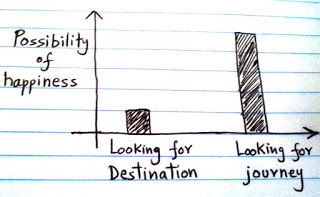 Most people understand this as a call to drop desires and to stop wanting. But how can you drop desires? Desires are born in the mind. A thought becomes a wish which becomes a want. So, as long as there is the mind, there will be wants and expectations. And expectations always bring agony! The better thing to do is to become more aware of the true nature of Life. Understand that whatever you desire, want and achieve – name, fame, glory, wealth, power and position – will not go with you when you die. So why obsess so much over what you can’t take with you and what can never be yours permanently? This doesn’t mean you should not be ambitious or competitive or excel at whatever you are good at. It only means that you must enjoy the process of living more than merely wanting to achieve a goal.
Most people understand this as a call to drop desires and to stop wanting. But how can you drop desires? Desires are born in the mind. A thought becomes a wish which becomes a want. So, as long as there is the mind, there will be wants and expectations. And expectations always bring agony! The better thing to do is to become more aware of the true nature of Life. Understand that whatever you desire, want and achieve – name, fame, glory, wealth, power and position – will not go with you when you die. So why obsess so much over what you can’t take with you and what can never be yours permanently? This doesn’t mean you should not be ambitious or competitive or excel at whatever you are good at. It only means that you must enjoy the process of living more than merely wanting to achieve a goal.
“Kaakka Muttai” helped me, yet again, visit a significant spiritual tenet: the journey is always sacred while the destination has no meaning! I believe the greatest service we can do to ourselves is to wake up, pause and smell the roses, drink in the scenery along the road, than worry and agonize about when and how we will get to our destination.
A couple of days back we watched the much acclaimed Tamil film “Kaakka Muttai” (2014, Manikandan) one more time. The film tells the story of two kids, brothers, from a slum and their travails to save money to buy a pizza. When they finally do get to eat a pizza both of them conclude that they didn’t quite like its taste. The film closes on this note and, as the credits roll, the best part of the film, a song plays in the background.
Edhai NinaithomAdhai AdainthomAdaintha PinneUnmaiyai Naam Unardhom
Asaikku Thaan Alavugal IlayeAdhai Thodarnthaal Vaazhkai ThollaiyeAasaithaan Vendravan IlayeAthu Indru Thaan Unarthathu Pillaye
You can hear the original song here:
The song composed and sung by G.V.Prakash Kumar, with lyrics by Na Muthukumar, sums up why Life is sometimes so listless and meaningless despite all the trappings of material success. The song means that when we chase our desires, our wants, we often end up attaining them. Only to discover the truth that we feel lost, empty, unhappy too, with what we have attained! There’s no limit to desires, no one has ever conquered them, and the obsession to achieve those wants sometimes makes Life miserable. If you understand Tamil, the simplicity of the lyrics and GV Prakash’s soulful rendering will uplift your mood.
Hearing this song, made me reflect on what famous Hindustani singer Pandit Jasraj once told Shekar Suman on a TV show: “Kamyaabi ek shitij ki tarah hoti hai. Paas jao to aur door nikal jaati hai.”Meaning: “Success is like a horizon. You close in on it only to discover that it has moved farther away!”
The essence of Na Muthukumar’s and Pandit Jasraj’s perspectives is this: the journey is more important, in fact it is sacrosanct, than the destination. So, simply, enjoy the journey more than obsessing with the destination.
 Most people understand this as a call to drop desires and to stop wanting. But how can you drop desires? Desires are born in the mind. A thought becomes a wish which becomes a want. So, as long as there is the mind, there will be wants and expectations. And expectations always bring agony! The better thing to do is to become more aware of the true nature of Life. Understand that whatever you desire, want and achieve – name, fame, glory, wealth, power and position – will not go with you when you die. So why obsess so much over what you can’t take with you and what can never be yours permanently? This doesn’t mean you should not be ambitious or competitive or excel at whatever you are good at. It only means that you must enjoy the process of living more than merely wanting to achieve a goal.
Most people understand this as a call to drop desires and to stop wanting. But how can you drop desires? Desires are born in the mind. A thought becomes a wish which becomes a want. So, as long as there is the mind, there will be wants and expectations. And expectations always bring agony! The better thing to do is to become more aware of the true nature of Life. Understand that whatever you desire, want and achieve – name, fame, glory, wealth, power and position – will not go with you when you die. So why obsess so much over what you can’t take with you and what can never be yours permanently? This doesn’t mean you should not be ambitious or competitive or excel at whatever you are good at. It only means that you must enjoy the process of living more than merely wanting to achieve a goal. “Kaakka Muttai” helped me, yet again, visit a significant spiritual tenet: the journey is always sacred while the destination has no meaning! I believe the greatest service we can do to ourselves is to wake up, pause and smell the roses, drink in the scenery along the road, than worry and agonize about when and how we will get to our destination.
Published on November 06, 2015 19:27
Facing your fears makes you courageous
Guts and glory are mere perceptions
. The reality is in experiences and in learning from them. It’s through the experiencing and the learning that the soul is enriched.
When we watch a movie and admire a hero for the way he or she has fought for justice, against perpetrators of evil or crime or injustice, we come back feeling good. We loved the movie. But we don’t really think any of it is real. Because it’s just a story enacted for our entertainment. In real Life when we meet the actor, we do say we admire him or her and their ‘acting’. We know little about who they really are for us to be able to see the person behind the actor.
So it is with real Life heroism. Often people look at others around them and call them courageous and celebrate their valor or the stance they have taken in Life on fighting injustice or simply meeting a challenge head on. Someone who has found a deadly disease like cancer is often seen as a champion. Someone who has lived on despite the passing away of a loved one is believed to be very bold. Someone who fights injustice is seen as a ‘fearless’ crusader. And someone who refuses to run away from a seemingly impossible situation is believed to be incredibly resilient.
To be sure, everyone who has ever lived has had to encounter fear. Fear spares no one. Interestingly though all of us have the ability to be courageous. Because courage is not the absence of fear. Courage is what fear delivers when you face up to the fear. Because only when you face up to something, will you realize that it cannot harm you. Only what you run away from chases you, haunts you.
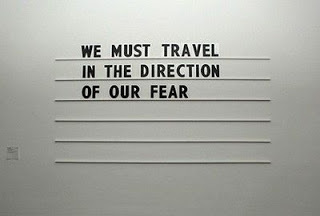 In a health challenge like cancer, you can feel fearful of death. But as long as you run scared of death, it will torment you. But the moment you discover that death is a non-negotiable eventuality that all of us who are born have to confront, you will no longer fear death. Then you start living. And despite your speeding to death, owing to your personal situation, you begin to feel blessed that at least you reasonably know how much time you have left to live. And you start investing in the living than obsess with the dying. Fear of death has delivered to you the ability__courage__to live simply because you stopped running away from death.
In a health challenge like cancer, you can feel fearful of death. But as long as you run scared of death, it will torment you. But the moment you discover that death is a non-negotiable eventuality that all of us who are born have to confront, you will no longer fear death. Then you start living. And despite your speeding to death, owing to your personal situation, you begin to feel blessed that at least you reasonably know how much time you have left to live. And you start investing in the living than obsess with the dying. Fear of death has delivered to you the ability__courage__to live simply because you stopped running away from death.
This is true with every Life situation. The more you run away from a problem, the more fearful you will be. When you face it, the problem, even if it doesn’t go away, will at least stop tormenting you. So, face your fears. It is from facing them that you become courageous!
When we watch a movie and admire a hero for the way he or she has fought for justice, against perpetrators of evil or crime or injustice, we come back feeling good. We loved the movie. But we don’t really think any of it is real. Because it’s just a story enacted for our entertainment. In real Life when we meet the actor, we do say we admire him or her and their ‘acting’. We know little about who they really are for us to be able to see the person behind the actor.
So it is with real Life heroism. Often people look at others around them and call them courageous and celebrate their valor or the stance they have taken in Life on fighting injustice or simply meeting a challenge head on. Someone who has found a deadly disease like cancer is often seen as a champion. Someone who has lived on despite the passing away of a loved one is believed to be very bold. Someone who fights injustice is seen as a ‘fearless’ crusader. And someone who refuses to run away from a seemingly impossible situation is believed to be incredibly resilient.
To be sure, everyone who has ever lived has had to encounter fear. Fear spares no one. Interestingly though all of us have the ability to be courageous. Because courage is not the absence of fear. Courage is what fear delivers when you face up to the fear. Because only when you face up to something, will you realize that it cannot harm you. Only what you run away from chases you, haunts you.
 In a health challenge like cancer, you can feel fearful of death. But as long as you run scared of death, it will torment you. But the moment you discover that death is a non-negotiable eventuality that all of us who are born have to confront, you will no longer fear death. Then you start living. And despite your speeding to death, owing to your personal situation, you begin to feel blessed that at least you reasonably know how much time you have left to live. And you start investing in the living than obsess with the dying. Fear of death has delivered to you the ability__courage__to live simply because you stopped running away from death.
In a health challenge like cancer, you can feel fearful of death. But as long as you run scared of death, it will torment you. But the moment you discover that death is a non-negotiable eventuality that all of us who are born have to confront, you will no longer fear death. Then you start living. And despite your speeding to death, owing to your personal situation, you begin to feel blessed that at least you reasonably know how much time you have left to live. And you start investing in the living than obsess with the dying. Fear of death has delivered to you the ability__courage__to live simply because you stopped running away from death.This is true with every Life situation. The more you run away from a problem, the more fearful you will be. When you face it, the problem, even if it doesn’t go away, will at least stop tormenting you. So, face your fears. It is from facing them that you become courageous!
Published on November 06, 2015 04:38



